#workstation for machine learning
Explore tagged Tumblr posts
Text
Which is the most vital element of a deep-learning workstation?

One of the most vital hardware parts of a deep-learning workstation is the GPU. Training neural networks is one of the important tasks in Deep learning are highly parallelizable. It means that the massive calculations in training neural networks can be divided into many smaller tasks that can be processed simultaneously. This is where GPUs work, as they are built for parallel computing, rendering them significantly faster than CPUs for deep learning tasks.
• Parallel Processing:
Deep learning, particularly training neural networks, includes immense amounts of calculations that can be segmented into smaller tasks processed simultaneously. GPUs are crafted for this kind of parallel processing, making them perfect for deep learning.
• CUDA Support:
NVIDIA GPUs with CUDA (Compute Unified Device Architecture) are favoured for deep learning due to their robust performance and compatibility with frameworks such as TensorFlow and PyTorch.
• VRAM:
The quantity of Video RAM (VRAM) on the GPU is also vital, as it dictates how large a model and dataset can be managed.
• Other Considerations:
While the GPU is essential, other components like the CPU (for standard processing), RAM (for managing large datasets), storage (for rapid data access), and a reliable power supply are also crucial. SO GPU is the most significant component for deep learning workstations.
When selecting a GPU, high-end models like the NVIDIA RTX series (e.g., RTX 3090 or the newer RTX
090) are perfect for deep-learning applications. These GPUs are equipped with thousands of CUDA cores, which allow them to carry out matrix operations that are crucial for training deep-learning models. Furthermore, newer GPUs in this series also include Tensor Cores, specifically optimized for AI workloads, further enhancing performance.
Key Considerations:
• Power Supply: High-end GPUs are incredibly power-hungry, often needing 350W or more. Make sure your workstation has a sufficiently powerful power supply unit (PSU), ideally 850W or above, to accommodate multiple GPUs.
• Cooling System: High-performance GPUs produce a lot of heat during demanding tasks. A workstation must possess an efficient cooling solution, which we will elaborate on later in this guide.
• Scalability: If your deep-learning projects grow, having a workstation that can accommodate multiple GPUs (2) is advantageous for accelerating training times.
The GPU is the core of any deep-learning system, as its performance directly correlates with the pace at which models can be trained, making it the most crucial component of your workstation.
#Deep learning workstation#ai and machine learning#AI and Machine learning workstation#animation workstation#CAD workstation#ai workstation
0 notes
Text
Top Legal Technology Solutions Companies

In today's fast-paced world, the legal profession is experiencing a profound transformation, and it's all thanks to the rapid advancements in legal technology. Gone are the days when legal professionals relied solely on paper-based records, endless hours of research, and face-to-face consultations. Legal technology is ushering in a new era, offering greater efficiency, transparency, and accessibility in the legal field. This editorial will explore the evolution of legal technology and the profound impact it has had on the practice of law.
#IT infrastructure#managed network services#process standardization#innovation#digital transformation#remote workstations#hybrid working#cloud management services#AI#machine learning#global market#outsourcing#revenue generation#Enterprise Networking Magazine#thought leadership#industry experts#market trends#virtual care services#partnership#efficient technology.
0 notes
Text
landoscar fic recs
the goats of landoscar fics to Me
impasse of biting - @wanderingblindly
12.5k | 2/2 | vampire au | barista!lando/vampire!oscar | M
"Maybe it would be good for you, something like this." Lando looks away from the espresso machine, over at Charles. "Like what?" "A vampire." "Charles," Lando breathes out, leaning against the back of his workstation and crossing his arms. "I've told you, it's not..." it's a me problem. He's the one that can't seem to connect to people, he's the one that's not noteworthy enough to want.
one of the first landoscar fics i ever read and it did change the trajectory of my life forever, liquid ur a genius btw. u could say im a real SUCKER for vampires…….
sgraffito - @ocontraire
19k | 1/1 | non-driver au | art teacher!lando/f1 driver!oscar | T
Maybe it could have been him, instead. It could have been him driving alongside Oscar, his hands lifting trophies, his dreams soaked in champagne. But Lando taught art while his brother raced, and he didn't regret it. Not when Oli seemed so happy.
hurt my feelings in the best way possible, pretty sure i cried, very beautiful overall
learned behavior - @passengerprincipessa
59.2k | 1/1 | 2024 season fwb / driver!lando/driver!oscar | E
Lando tries to win a championship and learns how to want.
THEEEEE landoscar fic, made me really weird about lando forever.
death and other lies - @finifugue
42.7k | 3/3 | spies but also so much more | assassin!lando/serial killer!oscar | M
Oscar kills people. Lando is legally dead. Someone wants to restart the war.
one of the most entertaining and well written fics i have ever read, incredibly devastating and heartwarming at the same time.
catechism - debrief
9.4k | 2/2 | theyre cats. | cat!lando/cat!oscar | T
“My faves are Temptation MixUps, but they only come in tubs,” Lando remarks. “I know how to open tubs,” Oscar says offhandedly. He knows how to what. “Will you marry me?” Lando asks without much thought.
prison break but cats, it is so silly and perfect
take it offline - @lellabellas
20k | 3/3 | office au doesnt even begin to describe it | ceo!lando/cto!oscar | M
"Why don't you put that mouth to better use, mate?" Lando's stomach turns even as he spreads his legs farther apart into a suggestive position. He's so fucked. Forget crossing a line; he's just pole-vaulted the line, done six backflips, and launched himself into the stratosphere. Half promises to hangers on in a bar is one thing—a little 'you take care of me, I'll take care of you,' and then never call them back. Coming onto a work colleague is something else entirely. But Oscar doesn't crack. He slowly closes his mouth that's fallen open in shock, licks his lips, and stares Lando down just as hard. "Alright."
blatantly unhinged and evil oscar is my favorite, and he is so well written in this fic, was on the edge of my seat the whole time and audibly gasped at least twice while reading it. Rancid in the best of ways.
run, rabbit, run (ive got you in my sights) - @saccharinenectarine123
8.5k | 1/1 | canon divergence | driver!lando/driver!oscar | E
Oscar's been obsessed with Lando since he was 14. Now they’re teammates at McLaren, and he's struggling to keep it together. Lando's not a better man.
LOVE when oscar is a loser who is obsessed with lando and lando is kind of evil about it, very beautiful outcome
sun kissed - @passengerprincipessa
45.5k | 6/6 | backpacking au | yachtie!lando/engineer!oscar | E
Oscar gets broken up with and impulsively books a four-week backpacking trip through Europe. He doesn't expect to fall in love along the way.
the most rom com fic ever + some of the most incredible character development everrrrrr incredibly heartwarming and feel good fic
in the firing line - @sincerelylancelot
5.3k | 1/1 | restaurant au | server!lando/chef!oscar | E
On Monday morning, Oscar finds a coffee next to his chopping board and a note.
i dont know why this fic itches my brain the way it does but i have read it 5 times and its perfect, simple idea + beautiful execution
certain uncertainty - @celellken
21.5k | 1/1 | ranch au | ranch hand!lando/ranch hand!oscar | NR
Oscar and Lando work on a ranch. Oscar is used to keeping his head down and his emotions in check. But when Lando arrives, all easy smiles and restless energy, Oscar finds himself thrown off balance.
slice of life found family ranch au...need i say more. deserves her flowers
the road not taken - @zelebrini
49.4k | 7/7 | slowburn exes to lovers | photographer!lando/vet!oscar | E
A long time ago, Oscar lost something he’s not sure he’s ever getting back.
WHAT IF UR OLD SITUATIONSHIP CAME BACK TO HAUNT U. AND HE WAS A BEAUTIFUL VET. AND U SAVED A CAT TOGETHER. so tragic...so amazing...i killed myself 17 times every chapter and loved every second of it
forget the protocol - astronautaficionado
68.7k | 10/10 | hockey au | goalie!lando/defenseman!oscar | E
By the time Oscar's first NHL contract ends, he's spent most of it in the minors. When he receives a controversial offer to join another team, it changes everything about his life, especially the hockey.
oscar psychologically tortures himself over a crush when literally nobody asked him to do that
so what are you waiting for? (its your serve) - @serve-cunt
76.4k | 11/11 | tennis au | tennis player!lando/tennis player!oscar | M
“Good evening and welcome to the press conference for Oscar Piastri,” said the organiser, in an officious, bored voice. “A reminder to keep your questions brief.” She pointed to a blonde woman in the first row. “Catherine, go ahead.” Catherine leaned forward. "First of all, Oscar, congratulations," she said. "With the points from this win you’ll be in the top twenty ranked male tennis players. That's a huge deal, especially this young. Did you expect that when you woke up this morning?"
just impeccable. oscar learning he can have sport and cute boy at the same time will get me every single time, and also now im fighting tennis demons
leading lines - @volantium
16.5k | 1/1 | fake dating au | photographer!lando/driver!oscar | T
Oscar blinks at him, slowly, mind gone horrifically blank. Lando keeps on talking but Oscar doesn’t hear any sound come out of his mouth. “What do you mean,” Oscar speaks over Lando, and can hear the audible click of Lando’s jaw snapping shut, “that you told your parents we’re dating?”
they r so stupid and i love them terribly
afterburn - @passengerprincipessa
75.1k | 5/5 | canon divergence | ferrari driver!lando/mclaren driver!oscar | E
At the end of 2027, Lando leaves for Ferrari. Oscar doesn't know why.
might just be The oscar character study, oscar learning he can have sport and cute boy at the same time once again
half-lives - anon
16.9k | 1/1 | gang au | gang member!lando/get away driver!oscar | E
Oscar is the crew's new getaway driver. Lando doesn't trust him. Doesn't like how calm he stays when things go to hell. But then things do go to hell, a job gone sideways, crew lost. Now it's just the two of them on the run. Bleeding. Breathing too close. Oscar starts seeing the cracks in Lando's armor. The way he folds when someone handles him right. The way he begs but never says it out loud. The hatred is always easy. What comes after isn’t.
i wish i knew who this anon was so i could kiss their brain for this utter masterpiece, running from the cops is my favorite brand of forced proximity
already home - @nyoomfruits
32.5k | 1/1 | non drivers + fake relationship au | producer(kinda)!lando/lawyer!oscar | T
Lando takes a deep steadying breath. “I think I might be in love with Oscar.” He says, and hates how immediately when he says the words, he knows it’s true. “Right,” Max says, nodding. “And?” “What do you mean, ‘and?’” Lando says, a little outraged. “I can’t be in love with him! We’re married! This is like, a disaster waiting to happen!”
rom com, friends to lovers, and fake relationship.....the holy trinity of fics i think
a single great error - @sincerelylancelot
12.4 k | 1/1 | magic + dark academia | everyone has magic powers | M
Lando reminds him of a black hole. Not just all-consuming and endless, but a bridge to infinite possibilities. Oscar’s hands can rip the universe apart, knit it back together, and feel the air shimmer where reality was—but to him, Lando is what’s left in that space: infinite and always.
heart! breaking! stuff! the sequel is also incredible.
off the record - anon
19.2k | 2/2 | pwp | secret camboy!lando/driver!oscar | E
Oscar stumbles upon a camboy account that looks a lot like Lando. It ruins his focus, rewires his brain, and makes him want things he shouldn't.
HOT. SO HOT. SO GOOD. ONCE AGAIN I WISH I KNEW WHO THIS ANON WAS SO I COULD KISS THEIR BRAIN. love when landoscar match each others freaks
negative splits - @ocontraire
10k | 1/1 | pro runners au | runner!lando/runner!oscar | T
So officially, Oscar Piastri, pretty good steepler and pretty bad pacer, was now a professional runner. They wanted him to steeple, mostly, though he’d be doing cross country in the fall, and Lando had pinky promised him, mid-distance guy to mid-distance guy, that if he wanted to get into the 3k flat indoor then he would get him in. Oscar didn’t really want to ask how he planned on doing that. Felt safer not to ask.
every single one of leaf's sport aus is a masterpiece, and this is no exception. top tier landoscar dynamics
#has been a long time coming also i have a bajillion more recs#my spreadsheet has over 200 fics#but these r my top tier read again and again fics#and to all the authors on this list u guys r so awesome.#please enjoy#f1#formula 1#ln4#lando norris#mclaren#op81#oscar piastri#landoscar#landoscar fic#fic rec#landoscar fic rec
328 notes
·
View notes
Text
The Quiet Equation - Part 2
Toto Wolff x You
Brackley was not like Cambridge.
It was quieter here—cleaner, colder. The kind of silence that hummed with machinery and method. The kind that felt like precision. Like control. It fit him. It fit you.
The team welcomed you politely, if not a little warily. A new intern. One of the top minds from Harvard, they’d heard. A special project, Toto had said, though the specifics remained vague. No one asked too many questions. Not when he was the one who brought you in.
You wore your badge like armor. Your smile, even more so.
But late nights at the factory wore down masks faster than you expected.
Especially when he started staying later too.
It started with the project—an exploratory model analyzing driver response to high-stress radio communication, cross-referenced with telemetry and biometric data. Something no one else on the team had had the time or audacity to attempt. But you did. You saw patterns no one else saw.
And he saw you.
Every evening, he’d check in—not hovering, not interfering. Just… there. His presence calm and centering, like gravity with a Viennese accent.
“You haven’t eaten,” he’d say, standing in your doorway with two mugs of tea, one always perfectly made the way you liked it. “Come. Five minutes.”
You would protest. He would wait. He always did. And eventually, he’d win. He always did that too.
One night, after a particularly long meeting with the strategy department, he appeared at your workstation just as you were rubbing your eyes and pulling your sweater tighter around your shoulders.
“You’re cold,” he said softly.
“I’m fine.”
He didn’t reply. Just turned and walked away.
Ten minutes later, he returned with a soft fleece-lined team jacket, still smelling faintly of him. He draped it over your shoulders without a word, fingers grazing your collarbone with an intimacy that felt almost accidental—but wasn’t.
You looked up at him.
His gaze didn’t waver.
.
You weren’t together.
Not really.
You shared tea and shared silences. He would leave post-it notes on your keyboard with one-word compliments scrawled in a sharp, slanted hand—“elegant,” “ruthless,” “brilliant.” You never responded to them, but you never threw them away either.
Somehow, the space between you kept shrinking.
You learned his tells—when he was frustrated, he’d tap the edge of his glasses on his knee. When he was pleased, he’d say your name softly, like it was something rare. A gemstone turned over in his palm.
And one night, when you both stayed well past midnight, the factory nearly dark, the sky outside bruised with summer storm clouds—you told him the truth.
“I’ve never been like this with anyone.”
He looked up from his laptop, eyes unreadable.
“Like what?” he asked.
You exhaled, fingers tightening around the tea he’d made you. “Soft.”
He was quiet for a moment. Then he reached across the table, slowly, deliberately, and placed his hand over yours.
His voice was barely above a whisper. “Neither have I.”
You never kissed in the factory.
But there were moments that tasted like it. His thumb brushing your wrist before a meeting. The way you’d stand a little too close at the coffee machine. The stolen looks that lingered across crowded rooms.
He kept his distance, but never too much. Never enough to forget he was watching.
And you? You stopped pretending not to love it.
.
By August, the project was complete.
The model was adopted for the next race strategy trial, and James had taken you aside to say you were dangerously clever. You thanked him and smiled like it didn’t mean everything.
Your last day came quietly. No farewell party, no big announcement. Just a final debrief in Toto’s office, where the blinds were drawn and the sun fell in soft golden stripes across the floor.
He stood when you entered. He always did. Old-world manners, like he hadn’t unlearned how to be gentle with valuable things.
“I should go,” you said after handing him the final files.
He stepped closer.
“You can stay,” he said simply. No pressure. No demand. Just… hope.
You looked up at him, heart thudding beneath your ribs like it might break loose.
“You’re twice my age,” you whispered. The fear still lived there. In the logic. In the math that never lied.
His eyes softened. “And yet, I’ve never met anyone who understands me better.”
Then, for the first time—finally—his fingers touched your cheek, trailing down to your jaw.
And when he kissed you, it wasn’t rushed.
It was reverent.
Like he had waited for exactly the right moment to show you just how long he’d been feeling it.
In that kiss, there was no classroom.
No power differential. No whispers. Just the two of you. Two minds. Two hearts. Brilliant. Lonely. Unmistakably entangled.
Part 3 ?
#fanfiction#fanfic#f1 imagine#formula 1 imagine#formula one imagine#toto wolff#toto wolff x reader#toto wolff x you#toto wolff x y/n#toto wolff x oc#mercedes amg f1#mercedes#formula 1#f1 fanfic#f1 fic#f1 x reader#formula 1 x reader#formula one x reader#age difference
83 notes
·
View notes
Text
im sorry but i need to geek out somewhere and screaming into the void on tumblr is less likely to get me flayed than on twitter, especially if i get terms wrong. plus i can do a read more and yall can click into the tech talk if you want to verse it bombarding your twitter timelines
so idk if i only liked it or if i actually put it in my queue but i saw a post that talked about a few pieces of tech that focus on user repairs and being sustainable (fairphone and frameworks laptop) and after doing some more research into what they have to offer i actually really excited that these products are finely hitting the us market and that people are moving away from the belief that super smooth streamlined glassy = the future. being able to reliably repair and keep what you have alive verse throwing the whole thing away when maybe all you needed to do is add more ram to your current laptop (something that i would do with my laptop to keep using it for a few more years if it wasnt glued shut and i was at risk of cracking the screen) or swap out a fuse.
i know big corporations dont like it but i truly do believe with how much tech we use on a daily basis that the way that we are going to be more environmentally friendly is to move back to tech that we can hang onto for as long as we can and to recycle and then reuse what we cant. like with the frameworks laptop. i saw that they just partnered with coolermaster to create a case specifically so that you can reuse you motherboard, cpu, etc and make a portable workstation. you could dual wield with the laptop you just upgraded if you want to dedicate specific tasks to one or the other. they also specifically mentioned that you could screw it into the back of a monitor and create your own all in one. guys thats cool as shit??? if you had a 3d printer and some time you could even create that yourself
on top of the actual hardware part moving to open source programs when your able. when i update my desktop i plan on running linux. it might have a learning curve compared to windows but in terms of performance??? ive heard that it runs smoother even on older machines, that its more efficient because isnt running stuff in the background that tracks your data and shit. now i understand that not everyone can do that because there are some programs that dont play nice with linux but for my needs at least it does everything i would need it to. and maybe a couple years down the road we do figure out how to run these programs on certain flavors of linux since its open source and people fiddle with it so much. (still looking for alternatives to like word and excel though, i use google docs since its free but i want to move away from them as much as i can too since they laid of their youtube music team (i believe?? it might of been a different branch) for trying to unionize)
if anyone knows of any other smaller companies that actually focus on sustainability and user repairability please let me know. theres certain pieces of tech that i think are now unfortunately behind a software repair paywall, things that used to be just machines and are gaining more bells and whistles like cars and refrigerators if that makes sense. but the more we push for these things to be repairable by us the consumers id hope that would change, or there would at least be options that dont need specific companies to repair them or else they blow up
159 notes
·
View notes
Text
JAYCE MAKE VIKTOR’S COFFEE EVERY DAY ❤️☕️☀️
Read the whole fic on AO3
Feel free to like, share, or leave a comment (I always reply!)
It’s been only a month since they started their official Hextech research collaboration, with the full support of Piltover Council. It was a thrilling new start, first steps on the exciting path to realize their dreams; a unique chance to build tomorrows better than yesterdays.
For the occasion, the Academy granted them a wide new workspace, functional, but impersonal. The place was perfect as it was in Viktor’s eyes. Growing up in Zaun, you learn to use what you have, and build no further expectations than sparse amenities. Jayce’s opinion appeared to be different, and Viktor has been quite amused by the efforts his piltie partner has gone through to make it more comfortable.
“We are going to spend more time here than in our home”, Jayce used to defend when Viktor mocked his latest fads.
The first thing he brought to the lab was a brand-new coffee machine. When Viktor saw Jayce installing it on their second day, he had to laugh.
“Do we really need that?” He asked, cocking a mocking eyebrow at the shiny bright equipment, much nicer than anything he ever owned.
“Of course, we do!” Jayce exclaimed as if Viktor was questioning the use of pens to write.
And gods knew he was right.
Even though Viktor was never fond of coffee bitter taste – he preferred to indulge his sweet tooth – being a night owl meant he was holding on caffeine for dear life to keep his brain at pace. Jayce was the morning person in their team. He was the type to wake up before the first beams of the sun, jump out of bed, and rush to the lab as soon as he could, excited to discover something new. He was buzzing with energy through the whole day, only caving into the need for caffeine after sunset, and ending completely unresponsive after the twelfth strike of the clock.
“I wish I was told I’d be working with a sunflower”, Viktor often teased gently, watching his partner’s head drooping just past 11:00pm.
Viktor himself couldn’t be more different. His brain thrived at night, keeping him awake as long as the moon could be seen in the sky, only shutting down out of exhaustion a few short hours before sunrise. His sleep was overpowering, heavy as lead, knocking him out on the instant his body collapsed on his mattress. He could only crack an eye open in late morning. Lost in a foggy haze, he was always struggling to crawl out of bed and to hobble his way to the lab, hooked to his crutch as he would to a lifeline. Even ideas as simple as getting breakfast were too much to ask. Aside from dropping himself on his chair like a sack of grain, Jayce couldn’t count on much of anything from Viktor before noon, not to mention any sort of response to external stimuli. On lucky mornings, Viktor sometimes uttered “hi” to which Jayce felt an irresistible need to poke fun at Viktor.
“I wish I was told I’d be working with a bat”, Jayce sometimes joked back, looking at his partners’ heavy eyelids on their first hours of work.
Despite his fair teasing, Jayce took it as a challenge. One of these crippling mornings, as Viktor pushed the heavy door of their lab, he was surprised by the rich smell of freshly brewed coffee, a warm cup shoved in his hands, and a cheerful “Good morning, Viktor!” thrown at him with a bright smile. Viktor stayed stunned, completely silent, staring at Jayce as he would at a four-legged chicken.
“… Mornin’ Jayce… Thanks…” he managed to mumble, before letting himself fall at his workstation.
At first, he thought about telling Jayce that this kind of attention was unnecessary, that he was perfectly capable of making his own coffee, thank you very much. But something stopped him from protesting. Maybe it was his usual morning exhaustion? The soothing warmth of the ceramic on his fingers and palms? Or that indescribable, alien twitch in his chest, that drew a small and tired smile on his lips? Inexplicably, the coffee Jayce made for him seemed to taste better, dissipating the heavy morning fog in his brain more efficiently. For the countless cups he used to forsake at every corner of his desk, spending half the day drinking only a cold ersatz of a brew, Jayce’s coffee was still smoking when he took his last sip.
Little did he suspect that this would be the welcome he’d receive every single day from now on. Every morning, as he pushed the lab door, he could breathe the cozy smell of fresh coffee in the air, and immediately knew Jayce was there, waiting for him, even before seeing his face. Then he felt the familiar warmth of the cup in his hands, the welcoming voice of his partner in his ears, and his heart got a little lighter. Getting out of bed was becoming surprisingly easier. A sleepy smile was even lighting his face as he walked toward the lab, looking forward to the day starting in such a pleasant way.
This morning however, there was no smell of coffee, no warm cup, and no welcome. He entered the lab in a cold silence. His eyes instinctively looked around, but Jayce was nowhere to be found.
“Am I really there first?” he silently wondered.
Since the start of their collaboration, he only managed to beat his enthusiastic partner twice at “who will be the earliest at work”. The first time happened on one of his sleepless nights; his leg was hurting too much, and he resolved to return to the lab, hoping to distract himself from the pain. The second time was a few days ago, when they got so caught in their research that they both slept in there, bent on their desks, heads in their arms. Oh, how his back made him regret this decision! He still hadn’t fully recovered, his unforgiving muscles dreadfully stiff, his shoulders and neck tense, stinging at every move.
Viktor stepped into the lab. The beat of his crutch on the floor was echoing endlessly on the stone-grey walls. The place felt confusingly unfamiliar. He almost wondered if he hadn’t got through the wrong door.
He dragged himself to the coffee machine, and muffled a swear when he noticed it was out of water. Refilling the tank, he went to gather his cup. He emptied the leftover cold substance of last night, and pressed the button to fill it, unbothered that it was still dirty. The smell wasn’t quite the same.
“You’re being ridiculous, Viktor”, he scowled himself internally. “Coffee is coffee. And you don’t need anyone to make it for you.”
Still, he was wondering what was is partner’s secret trick – there must be one, there was no way two coffees made of the same water, same grain, and same machine could smell and taste so different. Neither was it that one would lighten up his mood so much, while the other made him even grumpier than usual. That was scientifically impossible.
As he was about to reach his chair and kick off with today’s equations, his eyes dropped on Jayce’s abandoned cup in a corner of his desk. The sad little mug sat there, dangerously close to the void, forsaken, stained and empty, in the middle of a mess of scribbled papers. It somehow looked like its owner on the night Viktor interrupted him in his destroyed apartment. It simply didn’t feel right. With a sigh, he reached for it, shivering at the cold ceramic under his fingers.
Carefully, he brought it to their lab sink. The sound of water seemed deafening in the silence of the room. There was odd satisfaction to wash the dried residues away, the white paint emerging anew. He moved back to the machine and pressed the button. The smell of this coffee smelled frustratingly better than the one he just poured for himself. Viktor lifted his brow. How was that even possible?
“Maybe some minor chemical reaction with the soap residual molecules and the coffee?”.
The warmth of Jayce’s cup in his hands spread a smile on his lips. With a little laugh, he realized it was the very first time he was making someone else’s drink. How surprising it was, feeling so good about taking care of someone else with such simple gestures, while handling his own basic needs was never more than a burdensome chore. He contemplated the emotion in his chest for a moment, radiating through this body like the caress of the summer sun. He wondered if this was how it felt for Jayce, when he brewed his coffee every morning.
Carefully, he set up the smoking cup on Jayce’s desk, and then reached his own chair. Before moving back to his equations, he couldn’t resist a last quick glance at his partner workstation, ready for him to arrive. This felt, somehow, right and comfortable… almost domestic. As if it was all in the great order of how things should be.
Read more on AO3! 😊
https://archiveofourown.org/works/62473027/chapters/159882763#workskin
#jayce talis#viktor#viktor arcane#jayvik#jayce x viktor#act 1 jayce#act 1 viktor#arcane#ao3#ao3 fanfic#fanfic#fanfiction#Coffee#jayce is making great Coffee#Viktor is great at drinking Coffee
24 notes
·
View notes
Note
Hi writer-chan thank you for answering my request and I was hoping if you could write a 2012 donnie x fem Sally face reader who is very insecure and shy, likes to draw ( mostly donnie on every pages)
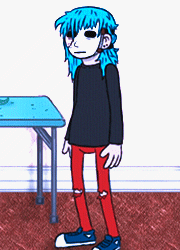
Hello shygirl2004-chan! Sorry for the delay in writing, but I hope you like it~ ♡♡♡♡

A Quiet Kind of Love *.✧

You weren’t the type of person who felt comfortable in crowds. Heck, you barely felt comfortable with yourself most days. Stoic, shy, and with a mask of indifference, people often mistook your reserved nature for rudeness. You didn’t mean to come off that way—it was just easier to keep to yourself than risk saying the wrong thing.
Your distinct appearance didn’t help. The prosthetic plate covering the lower half of your face was a permanent reminder of something you rarely talked about. Paired with your striking blue hair, it made you stand out in ways you didn’t want. You hated the way people stared. The whispers, the pitying looks, and even the cruel comments—they stayed with you long after you’d walked away.
You wore the mask not just out of necessity but as a shield. It hid your face, yes, but it also hid you, and you were okay with that. The only time you felt truly at peace was when you were drawing. Art was your escape, your way of processing the world.
And lately, one subject had become the center of your focus: Donatello.

You’d met Donnie through April. She was one of the few people you trusted, so when she told you about her mutant turtle friends, you decided to give them a chance. Meeting Donnie, though, was different from meeting the others.
At first, you were nervous. What if he thought the prosthetic was weird? What if he pitied you or worse—asked questions you didn’t want to answer? But he didn’t. Donnie barely even seemed to notice the mask. He was far more interested in your interests, and the way your eyes lit up when you talked about something you were passionate about.
Despite your blunt, monotone responses, he seemed to genuinely enjoy talking to you, especially when it came to your shared love of learning.
One day, you were in the lair, sitting in a quiet corner while Donnie worked on one of his gadgets. You loved these moments—the calm hum of his machines, the soft glow of his workstation. You were sketching as usual, trying to capture the delicate angle of his jaw, when his voice broke your concentration.
“What are you drawing?” he asked, tilting his head curiously.
You snapped your sketchbook shut so quickly it startled him. “Nothing,” you mumbled, your voice low but firm.
He gave you a look but didn’t press. “Alright,” he said, turning back to his work.
Later, though, while you were distracted helping Mikey with something in the kitchen, your sketchbook slipped out of your bag and onto the couch. Donnie, curious, picked it up, flipping through the pages.
He was stunned. Page after page of him, drawn with such care and detail that it took his breath away. You’d captured him in ways he hadn’t even noticed about himself—the way his goggles sat on his head, the concentration on his face when he was lost in thought.
When you came back and saw him holding your sketchbook, your heart dropped.
“You weren’t supposed to see that,” you mumbled, snatching it from his hands.
“Y/N,” he said softly, his voice filled with something you couldn’t quite place. “This is amazing...”
Your face turned bright red beneath your prosthetic. “It’s not a big deal,” you said, looking away.
“It is to me,” he insisted.

After that, things between you and Donnie shifted. He started asking more questions about your art, about your life, and eventually, about the prosthetic.
“I don’t want to make you uncomfortable,” he said one night, his voice gentle. “But if you ever want to talk about it, I’m here.”
You hesitated. It wasn’t something you shared easily, but there was something about Donnie that made you feel safe. “I… got hurt. A long time ago,” you said quietly. “The prosthetic—it’s just how I look now.”
He nodded, not pressing for details, and somehow that made it easier. You began to trust him in a way you hadn’t trusted anyone before.
But that didn’t mean your insecurities disappeared. You still felt self-conscious, especially when you caught him staring. “Stop looking at me,” you’d mumble, your tone sharper than you intended.
He always smiled gently. “I’m not staring,” he’d say softly. “I’m admiring.”
One evening, you decided to be brave. You’d drawn something special for him—a portrait of him working on his computer, with tiny notes in the margins about the things you admired about him: his focus, his creativity, his kindness.
You handed it to him with trembling hands, barely able to meet his gaze. “I, um, made this for you,” you said, your voice quieter than usual.
He took the drawing carefully, his eyes widening as he studied it. “Y/N… this is so cool!” he said, his voice filled with awe.
“I-it’s nothing,” you mumbled, trying to play it off.
“It’s not nothing,” he said, his voice firm but gentle. He looked up at you, his eyes soft. “Thank you.”
As your relationship grew, you expressed your feelings for Donnie through little acts of service.
In return, he showed his love for you in his own way. He built you a custom sketchbook, designed specifically to hold your charcoal drawings without smudging. He also created a small stand for your prosthetic, something that made it easier for you to clean and maintain it.
And on nights when your insecurities felt overwhelming, when you couldn’t stop staring at your reflection and hating what you saw, he was always there. “You’re more than what you see in the mirror,” he’d say, his voice steady and sure. “You’re brilliant and creative and kind. And I wouldn’t change a single thing about you.”
#reader#x reader#y/n#tmnt#tmnt x reader#f!reader#tmnt 2012 x reader#tmnt 2012#tmnt donnie 2012#tmnt mikey 2012#tmnt leo 2012#tmnt raph 2012
43 notes
·
View notes
Text

Tools of the Trade for Learning Cybersecurity
I created this post for the Studyblr Masterpost Jam, check out the tag for more cool masterposts from folks in the studyblr community!
Cybersecurity professionals use a lot of different tools to get the job done. There are plenty of fancy and expensive tools that enterprise security teams use, but luckily there are also lots of brilliant people writing free and open-source software. In this post, I'm going to list some popular free tools that you can download right now to practice and learn with.
In my opinion, one of the most important tools you can learn how to use is a virtual machine. If you're not already familiar with Linux, this is a great way to learn. VMs are helpful for separating all your security tools from your everyday OS, isolating potentially malicious files, and just generally experimenting. You'll need to use something like VirtualBox or VMWare Workstation (Workstation Pro is now free for personal use, but they make you jump through hoops to download it).
Below is a list of some popular cybersecurity-focused Linux distributions that come with lots of tools pre-installed:
Kali is a popular distro that comes loaded with tools for penetration testing
REMnux is a distro built for malware analysis
honorable mention for FLARE-VM, which is not a VM on its own, but a set of scripts for setting up a malware analysis workstation & installing tools on a Windows VM.
SANS maintains several different distros that are used in their courses. You'll need to create an account to download them, but they're all free:
Slingshot is built for penetration testing
SIFT Workstation is a distro that comes with lots of tools for digital forensics
These distros can be kind of overwhelming if you don't know how to use most of the pre-installed software yet, so just starting with a regular Linux distribution and installing tools as you want to learn them is another good choice for learning.
Free Software
Wireshark: sniff packets and explore network protocols
Ghidra and the free version of IDA Pro are the top picks for reverse engineering
for digital forensics, check out Eric Zimmerman's tools - there are many different ones for exploring & analyzing different forensic artifacts
pwntools is a super useful Python library for solving binary exploitation CTF challenges
CyberChef is a tool that makes it easy to manipulate data - encryption & decryption, encoding & decoding, formatting, conversions… CyberChef gives you a lot to work with (and there's a web version - no installation required!).
Burp Suite is a handy tool for web security testing that has a free community edition
Metasploit is a popular penetration testing framework, check out Metasploitable if you want a target to practice with
SANS also has a list of free tools that's worth checking out.
Programming Languages
Knowing how to write code isn't a hard requirement for learning cybersecurity, but it's incredibly useful. Any programming language will do, especially since learning one will make it easy to pick up others, but these are some common ones that security folks use:
Python is quick to write, easy to learn, and since it's so popular, there are lots of helpful libraries out there.
PowerShell is useful for automating things in the Windows world. It's built on .NET, so you can practically dip into writing C# if you need a bit more power.
Go is a relatively new language, but it's popular and there are some security tools written in it.
Rust is another new-ish language that's designed for memory safety and it has a wonderful community. There's a bit of a steep learning curve, but learning Rust makes you understand how memory bugs work and I think that's neat.
If you want to get into reverse engineering or malware analysis, you'll want to have a good grasp of C and C++.
Other Tools for Cybersecurity
There are lots of things you'll need that aren't specific to cybersecurity, like:
a good system for taking notes, whether that's pen & paper or software-based. I recommend using something that lets you work in plain text or close to it.
general command line familiarity + basic knowledge of CLI text editors (nano is great, but what if you have to work with a system that only has vi?)
familiarity with git and docker will be helpful
There are countless scripts and programs out there, but the most important thing is understanding what your tools do and how they work. There is no magic "hack this system" or "solve this forensics case" button. Tools are great for speeding up the process, but you have to know what the process is. Definitely take some time to learn how to use them, but don't base your entire understanding of security on code that someone else wrote. That's how you end up as a "script kiddie", and your skills and knowledge will be limited.
Feel free to send me an ask if you have questions about any specific tool or something you found that I haven't listed. I have approximate knowledge of many things, and if I don't have an answer I can at least help point you in the right direction.
#studyblrmasterpostjam#studyblr#masterpost#cybersecurity#late post bc I was busy yesterday oops lol#also this post is nearly a thousand words#apparently I am incapable of being succinct lmao
22 notes
·
View notes
Text
Day 64 (2/3)
Eleuthia-9
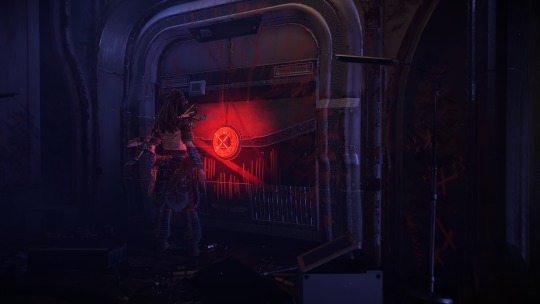
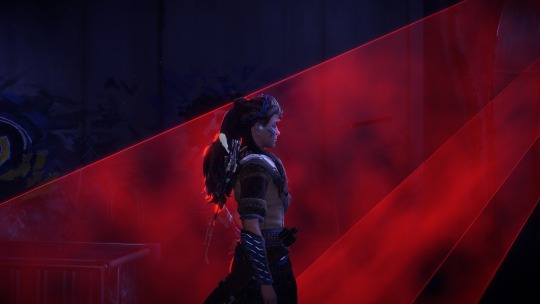
This was the door they could never pass, sealing away the other chambers of the Cradle, within sight but out of reach. They scored the door with angry red crosses in their rage. I passed through without problem.
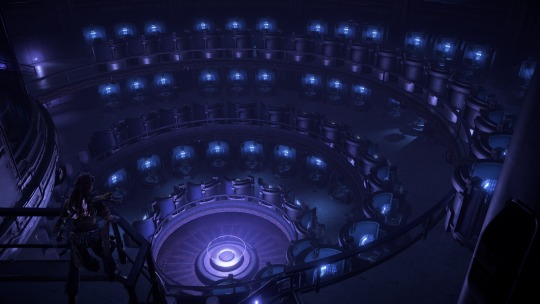
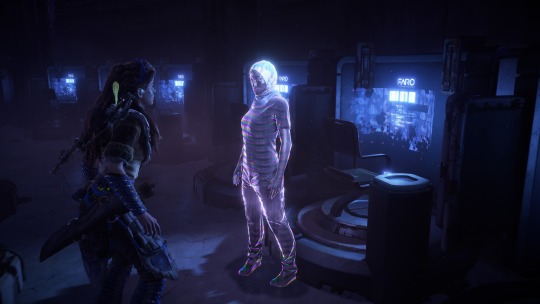
Inside were workstations, each equipped with a Focus, sitting here untouched for centuries. I picked up all those that were still functioning for later use. I'll use Sylens' technique of backing up data to other Focuses as well. They're fragile things. Each Focus held only one message, an address from Samina Ebadji welcoming the children to Apollo and the beginning of their education. Then the message cut out, a voice saying that Apollo was offline. Sylens was eager for a way to bring it back online again. If there is one, I'll try to restore it, but finding out the truth about Gaia and my origins is more important.
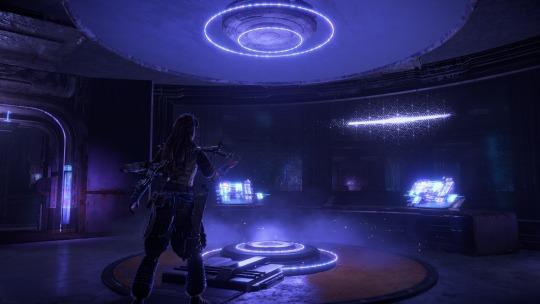
Further on there was a hologram projector; a smaller version of those in the Zero Dawn facility. The machine announced a priority message for Elisabet Sobeck. For me.

Unlike the other holograms, this one covered the entire room; it was like being transported somewhere else. Darkness all around, and a glowing dome like the scanning radius of a Focus. The subordinate functions appeared first, each emitting a ray of holographic icons that coalesced to form Gaia. This time, nearly a millennia after her initial conception, she resembled the form from Elisabet's presentation, her dress shifting between shades, her movements like that of a human.

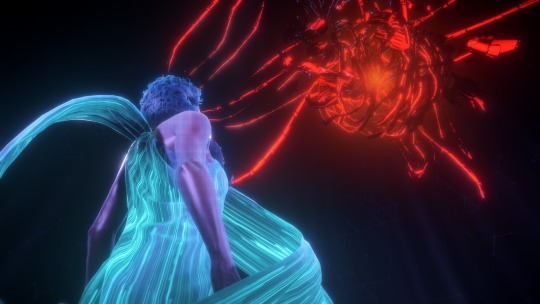
Gaia spoke of an unknown transmission that struck her systems—as sudden as a bolt of lightning, by the images she showed me. She said it...transformed her subordinate functions into intelligent, distinct, self-governing entities. Made them into AIs? I didn't know they could be created so quickly. From the data I've found, it used to take years, and they had to learn, but the functions were given intelligence and will out of thin air.
Given control over its own actions, Hades activated itself and began taking control away from Gaia as it was meant to in the event of a botched biosphere. By reversing terraforming operations, it could render life extinct in fifty days. To prevent this, Gaia resorted to destroying herself and Hades with her. This would buy time, but eventually the terraforming system would break down without a central governing intelligence. She said it would become 'increasingly erratic' in the meantime—the Derangement, I gathered, and the chaotic weather too.


Her solution was to generate a...reinstantiation of her creator. A copy; a clone. She said that 'high-level directives' prevented her from communicating directly with humans. I wonder why—is it because Apollo is offline, or was she never intended to speak to us in the first place? Gaia hoped that I would reenter the Cauldron in adulthood—perhaps the scan wouldn't have worked when I was young—take one of the Focuses and use it to view her message to me. From there I would be able to enter the other ruins of Zero Dawn facilities across the lands and repair the terraforming system before it was too late.
Gaia spoke to me as if I was Elisabet, used her name, relied on and believed in me as if I really was her. Did she understand that I'm not—that I don't remember, don't know anything about how to fix her?
Repair couldn't come until after Hades' destruction anyway, or it would only attempt to resume where it left off. Gaia directed me to the 'master override'—a tool in the facility where she operated from for all those centuries. With it, I would be able to purge Hades permanently.


Before Gaia could finish her instructions, Hades made its move in response to its imminent destruction. It dissolved the 'shackles' keeping it and the other subordinate functions within the system. They fled from Gaia's reach, escaping. Then Hephaestus wasn't the only other function to escape—they're all out there, hiding in ancient ruins, wreaking havoc wielding ancient machines. Are they all as dangerous and murderous as Hephaestus?
In its final act before fleeing itself, Hades corrupted data throughout Gaia's systems, including the Alpha registry in the Cradle. From that, Gaia knew I wouldn't be able access her instructions. Her final words as she burnt away into embers, the explosion destroying her central intelligence as her functions soared free, were words of hope. She believed that I, Elisabet, could succeed against the odds, as I once did long ago.
I guess she was right.
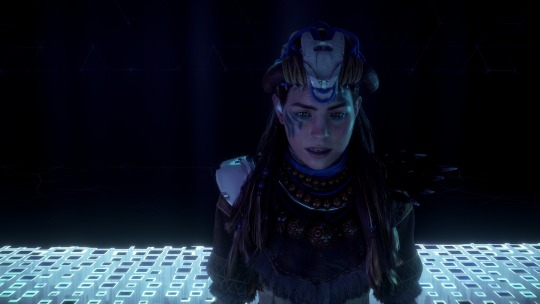
As the hologram faded out, it hit me all at once. I was never a person, just a tool forged with intent, something Gaia made to fix her systems in the fire of her death. There was never anyone waiting for me. The curse that the Nora speak of really did begin at my birth—the machines going rabid, the world spinning into chaos. Made by a machine to remake that machine that I once made in a life I can't remember.
Sylens snapped me out of it. There were two sides to this revelation. I have a mission, a purpose, and my path forward is clear. It's the only path. If I don't walk it, everything will die. Gaia was my mother, in a way, and Elisabet was too.
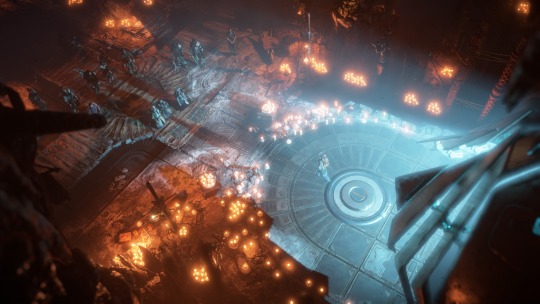
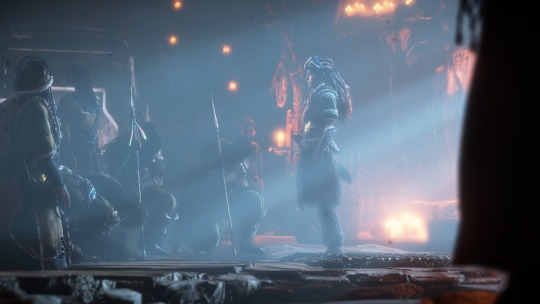
When I exited the hatch, half the onlookers were already kneeling. When Teersa asked me if I spoke to the goddess, I could find no better way to explain the truth. I was born to lift a curse, I told her. I was born to kill Hades, the Metal Devil of a new age.
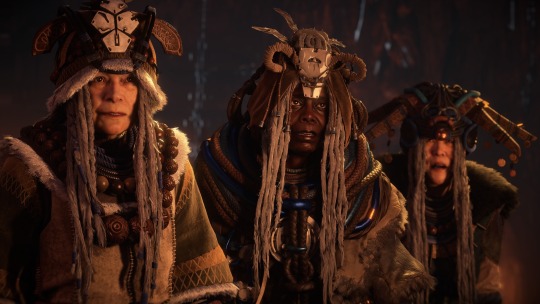

Before I could stop them, the Matriarchs declared me Anointed of the Nora, calling for the faithful to praise me. They all fell to their knees, heads and palms pressed against the ground. Maybe I should have just stood there and taken it, but I couldn't. The anger I'd been harboring all my life came to the surface and I yelled at them, grabbed them, hoisted them to their feet, as many as I could reach. All those years they shunned me, ignored my existence or worse, and now they're using those very same backwards, cruel, nonsensical myths to set me apart above instead of below, call me their saviour, their prophet, theirs. I never was, and I never will be.
For centuries they've stayed here, kissing the ground that spat them out into a world that wasn't ready, forcing fear and ignorance onto all their people. I won't represent that.
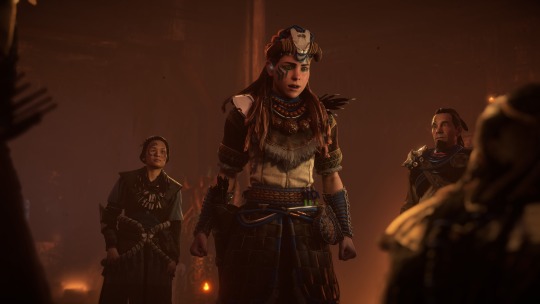
I knew they would listen to me, for better or for worse, and so I told them what I'd learned. There's a whole world out there. Not a valley, not the sightlines of a single mountain, a world larger than they can imagine all coming to an end, full of people who deserve to be saved, no less favoured by the 'goddess' who created them. I told those who could fight to meet me in Meridian to do battle against the Eclipse when they launched their invasion. I thought it was a long-shot, but having been proven right, Teersa was looked to by the other Matriarchs to give orders. She bid them follow me into the west. I suppose they'll justify it by saying the blessing of an Anointed is far more powerful than the blessing of a mere Seeker.

I sought out Teersa once the crowd dispersed, though I could still feel their eyes on me. Even if Teersa's faith clouds her true understanding of what I am and why I was made, she's still the only reason I wasn't left in the wilds to die as an infant, and she's been kind to me. She always believed in me.
She told me Rost's story as well, finally. As the Anointed, which I guess is a thing, she didn't have much of a choice. What are oaths before the will of the goddess?
Rost committed no crime. Instead, he became a Death Seeker in a Nora rite that separates soul from body—whatever that means—to preserve the soul in All-Mother's protection while the body wanders from her sight. Once gone, the body is never permitted to return. Rost went through this ordeal to seek vengeance for a group of hostages taken and slain by outlanders, their corpses left in open mockery just across the border of the Sacred Lands. Teersa said the tribe never discovered who the outlanders were or what they wanted, but they delved in the ruins of Devil's Thirst, emitting strange, metal noises in their search. One of the hostages was Rost's six year old daughter, Alana. He never said.
On his quest for revenge, he journeyed north to Ban-Ur, further west to the Claim, through the Sundom and further still, to Utaru lands and Tenakth, then even deeper into the Forbidden West. He killed all twelve of the outlanders for their crimes. Rost returned to the Sacred Lands on the brink of death. He didn't even make it over the border on his own; another Nora broke taboo to drag him across. Law said he should have been left for dead, but knowing all that he had sacrificed for the tribe, the tribe couldn't follow through. They nursed him back to health and the Matriarch's 'compromise', in their infinite generosity, was to outcast him for life. Can't have a man without a soul in your village, that's just logical. And convenient, when the time came to get rid of me. Instead of leaving me to die, they left me in the care of a man who had lost a young daughter of his own. Teersa saw wisdom in that act, not cruelty, and said she was grateful for all Rost had done to raise and train me in the ways of Nora faith. He was so devout, I suppose no one else could have done better. I must just be resistant to that sort of thing.
Talking about Rost brought back old feelings. I should go and visit him again.
And I thought of Olin, too. Both Rost and I embarked from the Sacred Lands seeking revenge, but while the twelve outlanders displayed plain, remorseless cruelty—at least the way Teersa told it—Olin only obeyed the Eclipse to protect his family. His own young child. Killing him was a senseless act. Maybe's Rost's revenges were senseless too—the outlanders were unlikely to return, and all that was preserved in their continued existence was the injustice, the unhealed wounds of pride. He did it for the honour of the tribe, that nebulous thing. I thought myself distant from it, yet bent to its demands like all the rest. If I had let Olin live, he would have helped me take on the Eclipse. I had nothing to gain in slaying him, and far more to lose.
No sense in dwelling on it. There are worse crimes; I believe he forgave me.

I went to Lansra next. It was difficult to ignore her, with her wailing for my forgiveness as I walked past, bowing her head and raising her arms in half cower, half worship. She lamented her misreading of the signs—honestly I was expecting her to double down and say I'd gone into All-Mother's domain to plant a curse in her core. With the rest of the tribe against her, it's hard to tell whether she earnestly believes she was wrong, or is just going along to maintain her position. But she's likely too stupid for such elaborate deception. She doesn't think, doesn't care to look—just fears and lashes out against all things new or confusing to her. She grovelled, begged, touched her head to the floor in supplication. I couldn't stand it. I tried to tell her to open her eyes, to try and learn, but she took my advice literally. I told her to shut her mouth. She took that literally too. All of a sudden the cave was far more peaceful.
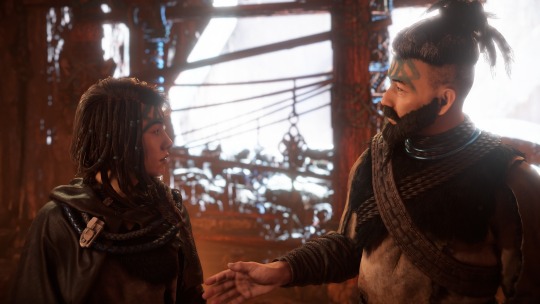
I met Arana and her father nearby. Thok tried to stop Arana from speaking so openly to the 'Anointed'. Great, more reasons for the Nora not to speak to me. I assured them it was alright, and to drop the titles, but I'm not sure they will. Arana brought her mother's spear all the way to the mountain, and I thanked them again for the improvements they made to my own.


I took some enjoyment in facing Resh as well. He stuck to his principles where Lansra failed to. Now that the tribe had accepted me as their figurehead, it was his tribe no longer. He said he would be leaving these lands first chance he got. Who's the outcast now?
I also spoke to Teb again, and though I tried to dissuade him from calling me the Anointed, he did so only outwardly. I could tell he idolised me, but he had done so since the Proving; my entering the mountain only solidified his belief. I asked him to stay here in the Embrace, at least, but he refused and said he would join me in Meridian. It would be a shame to see him killed for a cause I promoted after saving his life all those years ago. I wish he'd just stay safe.
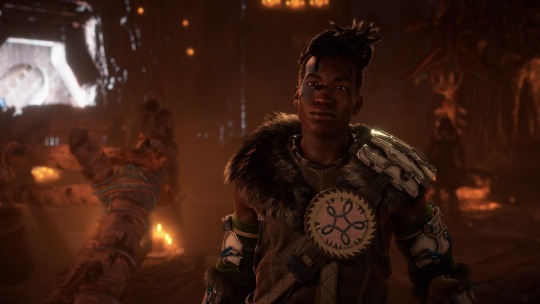

Varl was waiting further on. He said he would join me in Meridian, and I would've expected no less of him, but what I did expect was...some sort of curiosity. I offered to show him the inside of the mountain, but he shut that down quick. Even my offer to tell him what I'd learned, to explain my mission, he said he would hear only if the 'goddess willed it'. I thought he was different to the others, that maybe...I thought I could rely on him, that's all. But he's just as willfully ignorant as the rest.
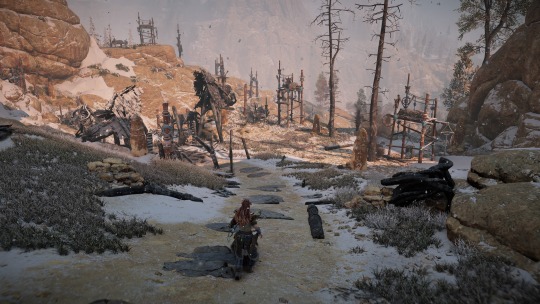
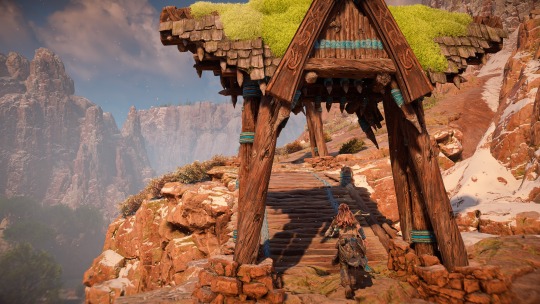
I couldn't stay after that, especially not with all the Nora staring, whispering prayers as I passed. I left the mountain and walked through the cooling ruins of Mother's Watch, taking the long way around to Rost's lodge on the western side of the cliffs enclosing the Embrace. Walking these roads now is even stranger than before. It's not just the charred ruins, the corpses of Deathbringers dotting the valley, it's what this valley means. What all of it means. It was on these lands that the first people born into a new world stepped, and made sacred. Everything that came after was made from the stories they spun to explain their existence. Only Sylens and I know the truth.
#again with the lore. god damn#her reactions to varl were heartbreakinggg. thank you remaster for giving the characters expressions#I could have squashed into 2 but eh#hzd#horizon zero dawn#aloy#aloy sobeck#aloysjournal#hzd remastered#photomode#virtual photography#horizon
8 notes
·
View notes
Text
the body is a soft animal.
a/n: i have a long-ish fic planned for a cyberpunk 2077 au with nanami on the brain. i just had a specific scene that haunted me and i didn't where to put it in terms of the fic, so i just wrote it (also because i needed a taster of sorts to motivate me into writing the rest of the fic). also, this is the longest piece i've written in a while, so i just want to celebrate a little haha.
fandom: jujutsu kaisen
character: nanami kento
genre: general / fluff (can be read as either platonic or romantic)
info: cyberpunk 2077 au; reader is a ripperdoc; nanami is a merc
warnings: mentions of injury; mentions of killing
synopsis: nanami wasn't sick but still, he found his way to you.
word count: 2.4k
companion fic to "these unfamiliar intimacies".

Nanami Kento
When you remotely unlocked the door to your clinic after hearing Nanami's voice over the intercom, the first thing out of your mouth was "Are you hurt?" He was inclined to say that he wasn't. At least, not physically. He came to see you after a particularly taxing gig that also happened to be physically strenuous, but it wasn't the lingering soreness in his muscles that made him want to see you.
"I'm not," he said after a while.
You had turned away from your workstation in the interval between your simple question and his admittedly late answer, and he could easily guess the next thing you'd ask him.
The question "Are you sick?" was formed in a warped version of your voice, ringing in his ears before the words left your mouth. Your voice didn't register the same way it did when he imagined it in his head, and it made him think that maybe, just maybe he was a little bit sick, after all.
"Physically, no."
You gestured to the examination table beside your workstation, turning your back to him once more to start up the necessary diagnostics equipment for a full-body scan. Nanami acquiesced, quietly crossing the room and adjusting the backrest himself before removing his shoes and then lying down.
The synthetic leather was freshly sanitised, traces of the bergamot-identical antiseptic spray you favoured wafting up into his nostrils. Glancing up at your side profile, he couldn't tell if you had been napping on the examination table before he interrupted it by unexpectedly announcing his presence over the intercom.
When you spun yourself to face him in your swivel chair, he lifted his hand so that you could jack him in for the scan. There was a sound that confirmed the security of the connection, and then there was a different sound that signalled the start of the process. A loading icon began playing in a loop on the little square screen on the largest of the machines, hovering over text that read "SCAN IN PROGRESS". The two monitors on your desk lit up, one with empty progress bars that quickly filled up and the other with a multitude of pop-up messages he didn't bother reading.
"From a medical standpoint, you're entirely healthy. All your cybernetic implants are in good working condition as well," you said, disconnecting him from your equipment. "If you'd like more specific tests run, we'll have to move to the university hospital in Shibuya."
Nanami met your gaze, and he wondered if you had to learn it. If you had to learn to keep your eyes emotionally vacant but intellectually keen. If it ever came in useful when breaking a notably dismal piece of news to someone.
A sigh escaped him before he could reel himself in.
"I came here to talk, actually," he said, sitting up. Your eyes never wavered. Instead, you simply hummed in acknowledgement and drew closer to him on the examination table.
Nanami readjusted the backrest so that he could sit comfortably, though it was more to keep his hands busy. He didn't know what he was doing. What was he trying to accomplish? He did mention wanting to talk. What did he want to talk to you about anyway? His relationship with you was strictly professional. The conversation that could potentially alleviate the pinch in his chest would have to be one between him and a friend he trusted with his life, and he didn't have many of those left.
"Would you like something to drink?" Your voice came from the far side of the room where you had a wall-mounted control panel. He cleared his throat and requested a hot black coffee, to which you nodded before tapping a few buttons on the screen.
You wheeled yourself back to him, crossing the span of the room in one kick, and you informed him that one of your service androids would be bringing his coffee within the next three minutes.
"Thank you," he said, and he felt like he was having his first non-work-related human interaction in decades. Had he spent so much time completing gigs alone that he had socially regressed to a kid who couldn't hold a conversation? Nanami cleared his throat again to banish the thought.
As much as he hated to admit it, maybe Gojou was right to suggest that he accept a few gigs where he'd be forced to work in a team. Gojou, despite his number of obvious flaws, was occasionally able to offer a piece of sound advice, after all.
The service android swiftly ducked into the room with two mugs and exited at the same speed before Nanami caught himself. He thanked you for the drink again, blowing on the surface of his coffee and then testing the temperature with a sip.
The coffee was just right in temperature and more than excellent in taste, and he gave a low hum of appreciation as his first sip slid down his throat.
He looked at you over the rim of the pristine white mug in his hand. You were watching the spheres of ice move in a current of your own creation, bobbing erratically as you twisted the straw you held between your thumb and index finger this way and that in the amber liquid.
"Whiskey?" he asked, fumbling over the singular word and cursing inwardly at himself for it.
You shook your head, appearing not to notice his perceived blunder as you continued swirling your drink with the straw. "I don't drink alcohol," you said. "It's apple juice."
The conversation halted when you picked up your drink and motioned for him to consume his. Nanami obliged, content to cup both hands around the warm mug in between tiny, leisurely sips of coffee.
There was something quite precious about your manner now that he had the proximity and the silence to observe you. You chose a sweet juice instead of every alternative that was available in your extremely well-stocked clinic. Your drink was served in what must be a personal mug with the caricature of a dog painted on beneath the transparent outer layers of glaze. These little things chiselled away at the stoic image of you he had from his first meeting with you, even if it was nothing but a vague recollection of his anaesthesia-laden mind.
Nanami almost laughed into his last sip. He thought of you the same way almost everyone else thought of him. The irony wasn't lost on him.
"Have you ever killed someone and regretted it?"
His temporary good cheer loosened his lips in a way that even a whole bottle of whiskey could not. One moment had him holding his laughter back out of politeness. In the next moment, some words in a fairly unfortunate sequence left his mouth before he could process them.
It spoke to the capricious state of his emotions that he didn't want to take them back.
You blinked slowly, your face tilted in his direction even if you weren't looking directly at him. He suddenly became intensely attuned to the whisper of your air-conditioning system, the consistent tick-tick-tick of the mechanical clock hanging by the door, the dull hum of the machines as they awaited another order from you.
"No," you said, looking him in the eye and propping your cheek against an upturned palm. "I do everything with purpose."
It shouldn't be of any concern to him. He was well-acquainted with the wretched state of the world he lived in. It'd be supremely difficult to find a person who hasn't killed someone by the time they've reached adulthood. He wasn't surprised by the insinuation in your reply.
It was your choice of words that left him feeling like he had trespassed on what should be a secret.
The touch of your knuckle to his chin alerted him to the fact that he had been gaping at you. Nanami immediately apologised, clenching his jaw when he wasn't speaking to keep from making the same mistake again.
He wanted to put the topic to rest. If you weren't elaborating of your own accord, then it wasn't his right to pry. In spite of this, he was still curious. Who did you kill? On what occasion? Have you killed more than once? On purpose?
You were taking your time with your apple juice, cheek still in your palm and eyes fixed on a spot on the mostly bare walls that was apparently visible only to you. From the other end of the folding coffee table, his traitorous mind superimposed a likeness of you sitting in the same chair adjacent to him.
You were leaning slightly over the same table, facing away from him as you expertly broke open the shotgun in your hands. The empty shells clinked against the surface of the table when you shook them out of the barrels. There was an open box of ammo sitting to your right. Your hand knew exactly where it was when you reached for fresh shells to slide into your weapon. You brought the barrels back up to close the break, and it was the sound of a click too real to be his imagination that snapped Nanami back to you.
'Everything with purpose,' you said. You would've made an excellent merc. Better than him, even.
"Have you killed someone and regretted it, Nanami?" You threw his question back at him. It was very uncharacteristic of you, and it gave him a pleasant tickle. He knew you as someone who diligently avoided small talk, and yet, here you were.
"I have," he started, careful to taste his words before he spat them out. "I accepted a gig to dispose of a cyberpsycho. I only found out that he wasn't at fault after the deed was done. I—"
He paused, but he wasn't sure what for. There were plenty of other related things that he was leaving out. You didn't need to know. Or did he not want you to know?
"Did the cyberpsycho hurt anyone before you were contracted to kill him?" you asked. There was that tickle again, running up his chrome spine and settling into spaces between the individual vertebrae. The very same spine that you had painstakingly put together yourself just a few months prior, when he had to be hauled into your clinic in bloodied bits and pieces.
Nanami nodded. "He killed 4 med techs and injured 13 other lab staff. An entire wing of a research facility was ruined," he said, and it instantly transported him to a day earlier when he was on that Militech property far outside city limits once again.
The entire building had been cordoned off a few days before his arrival. Business carried on as usual in the rest of the compound that was unaffected. It was only the ground zero of the cyberpsycho attack that looked like a scene out of those old-fashioned zombie apocalypse movies Yuuji enjoyed watching.
"If you hadn't neutralised him, he would've hurt more people," you said. "There's no reason to feel regret if your purpose was to protect people."
He had been a police detective before he did away with his badge and became a merc. The desire to protect was the lifeblood that kept him going before the change in career, even when the uniform he wore and had admired as a child was what the people committing atrocities against other people were also wearing. It was the same desire to protect that moved him to remain in a line of work where his hands would always be sullied by death.
How did you know? Maybe he was a children's picture book to your knowing eyes, open and simple to read.
When Nanami looked up from his hands, he intended to thank you. For listening to him, and for letting him feel heard. The pinch in his chest remained, but it had lost its nails after sitting by you for a little while.
When he met your eyes for the first time in what must've been at least half an hour, there was an unknown but very much welcome tenderness in them that he hadn't seen from you before. 'Tender' would've been one of the last words he used to describe you, before this conversation. He'd hazard a guess that you preferred being identified on the other end of the spectrum: 'efficient', 'immovable'. The same words other people used to describe him, too.
At this moment, you were tender, and he was breathing it in, basking in it. It was strange to feel soft, especially when the bulk of his body was an arrangement of predominantly metal parts engineered into the remains of his flesh.
The urge to thank you for putting him back together bloomed in him from all the half-formed thoughts in his mind. He wasn't so brazen as to believe that a lesser ripperdoc would've been able to manage what you have. There was a reason Gojou entrusted him to you in his time of emergency.
"You're good at this," Nanami said, instead. To tell you what was in his heart seemed to breach the boundary line of professional etiquette between a merc and his ripperdoc. Maybe there would be a time in the future when he could run his mouth in your presence, a little treat for him that hopefully amused you too. Maybe it would happen soon.
There was a quirk that nipped at the corners of your lips. He counted it as a smile, mirroring you in equal proportion.
"That's the first I've heard of it," you said, lifting your cheek from your palm and straightening your posture. The veneer of a stoic ripperdoc quickly took over the half-smile you graced him with.
"I'll be back when I need a listening ear," he said, presenting you with an offering – of goodwill? Friendship? – and surprising himself with the magnitude of hope he was attaching to it.
You blinked. He watched you visibly inhale, and you looked unsure of how to respond. There was a slight wrinkle in your brow as you mulled his declaration over. "Do come back," you said. "Don't wait until you've been bisected again to come see me."
Nanami chuckled at the unexpected joke, though comedy might not have been your intention. Your half-smile was missing from your face, but the amicable glint in your eyes told him everything he needed to know.
#jujutsu kaisen#jujutsu kaisen scenarios#jujutsu kaisen x reader#jjk x reader#nanami kento#fic#general#fluff#longfic: tui#kaija writes#kaija writes: jujutsu kaisen#i keep thinking about him!!!#i took a break from playing the game to write this fic because she's been haunting me#because#ripperdoc reader and merc nanami have my entire heart!#reader: -__-#nanami: -__-#but they're enjoying themselves!!!#they're in love and having a little heart to heart!!!#do you see my vision#i'm obsessed with them
21 notes
·
View notes
Text
High VRAM Graphics Card for AI Training in UAE: A Deep Dive for Enthusiasts and Professionals
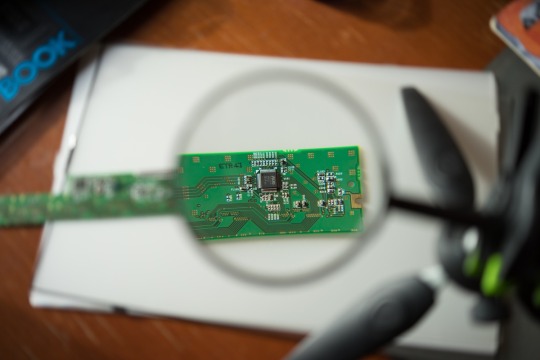
The need for specialised processing power has increased as a result of artificial intelligence's (AI) rise in the United Arab Emirates. High VRAM graphics cards are now necessary for deep learning models and AI training, not optional. Selecting the best GPU for AI model training can be a game-changer for anyone looking for strong, AI-ready hardware in Dubai, Abu Dhabi, or Sharjah, whether they are data scientists, AI researchers, or tech enthusiasts.
#High-Performance AI Workstation#AI Training PC#Best PC for AI Development#Deep Learning Workstation#Machine Learning PC Build#Powerful Workstation for AI#PC for AI and Deep Learning
1 note
·
View note
Text
CPU Requirements for Machine Learning and AI Workstations

CPU Requirements for Machine Learning and AI Workstations From conventional regression models, non-neural network classifiers, and statistical models that are represented by capabilities in Python SciKitLearn and the R language to Deep Learning models using frameworks like PyTorch and TensorFlow, there are many different kinds of machine learning and artificial intelligence applications. There may also be a great deal of variation among these various ML/AI model types. Although the "best" hardware will generally follow certain patterns, the ideal specifications for a particular application may differ. We will base our suggestions on generalizations from common workflows. Please be aware that this is more about programming model "training" than "inference" using AI machine learning workstation hardware. CPU (processor) Performance in the ML/AI space is typically dominated by GPU acceleration. But the platform to support it is defined by the motherboard and CPU. The fact that preparing for GPU training requires a substantial amount of work in data analysis and cleanup, which is typically accomplished on the CPU, is another truth. When GPU constraints like onboard memory (VRAM) availability necessitate it, the CPU can also serve as the primary computing engine. Which CPU is ideal for AI and machine learning workstations? AMD Threadripper Pro and Intel Xeon W are the two suggested CPU systems. This is due to the fact that both of these provide outstanding memory performance in CPU space, exceptional stability, and the ability to provide the necessary PCI-Express lanes for multiple video cards (GPUs). In order to reduce memory mapping problems over multi-CPU interconnects, which can result in issues mapping memory to GPUs, we often advise single-socket CPU workstations. Does machine learning and AI speed up with more CPU cores? The anticipated load for non-GPU operations will determine how many cores are selected. It is generally advised that each GPU accelerator have a minimum of four cores. However, 32 or even 64 cores can be perfect if there is a sizable CPU computation component to your task. In any event, a 16-core CPU is typically regarded as the bare minimum for this kind of workstation. Does AI and machine learning perform better on AMD or Intel CPUs? Choosing a brand in this market is primarily a personal decision, at least if GPU acceleration is the primary factor in your workload. However, if some of the technologies in the Intel oneAPI AI Analytics Toolkit may improve your workflow, the Intel platform would be better. Why are Threadripper Pro or Xeon CPUs suggested over more "consumer" level CPUs? When it comes to ML and AI workloads, the main justification for this advice is the number of PCI-Express lanes that these CPUs support, which will determine how many GPUs can be used. Depending on motherboard design, chassis size, and power consumption, the AMD Threadripper PRO 7000 Series and Intel Xeon W-3500 both have enough PCIe lanes to accommodate three or four GPUs. Additionally, this processor class offers eight memory channels, which can significantly affect performance for tasks that are CPU-bound. The fact that these processors are enterprise grade and that the platform as a whole is probably resilient to high, continuous compute loads is another factor to take into account.
0 notes
Text
youtube
A few years ago I started making a video to go alongside the Blood Cultures album I was rlly into at the time - I think a Terrible Life Event happened at the time and made me sorta forget it existed. and also I had a hell of a time during the process bc my PC isn’t a workstation and renders video content at the speed and eloquence of old runny egg. I’m sharing it bc it was a cool idea and I wanna do more w/ it; even if it’s in a different context.
The source of the video is Pas De Deux via the Canadian film board - very popular royalty free footage from the 70s of dancers with delayed feedback in their motions. I think the term is ‘timewarp’ now, for the equivalent effect in AE. I had visions of combining data moshing techniques with the motion feedback to create a trippy new thing.
anyways, it’s a cool thing that I never finished. I wanna do more video, but boy howdy it feels like an entirely different machine. the cautious voice in my heart says ‘make gifs to start :)’ but designing interesting motion is, itself, the hard part to me. I could learn processing or touch designer to help alleviate that and give me new options for output, but those are both, as they say, “high skill ceiling” paths. I don’t know if I’ve got the gusto to learn a new thing from scratch just so I can maybe someday play around with it. beware of the glitch-artist-to-warehouse-party-VJ pipeline.
#my art#music#blood cultures#art wip#glitch art#aesthetic#art#artwork#webcore#internetcore#glitchcore#abstract#artists on tumblr#dancers#pas de deux#ballet#Youtube
7 notes
·
View notes
Text
@bishop-percival
(Previous) Autumn chuckled. “Eh, I guess I see plenty of nerd fights right here in the Glornch.” She placed a neat stack of towels in their designated spot on a wire shelf, then returned to the folding table to start in on a few washcloths, seemingly the last of the laundry for the night. “Now, If you wanna see a good poisoning, you oughta see what some of Miriam’s magic poison potions can do. Those put on a show. Turning your blood and veins black, making your skin peel…” As this conversation was going on, there was another person in the room quietly, secretly, uncomfortably listening in. It was Thomas, now a ghost. After being brought back to this realm, he swore to himself he’d stay far away from the Glornch, keenly aware of the dangers simply being there posed. And yet there he was in the laundry room, waiting for Theodore to be alone. He didn’t know where and when else to look for him. Being back amongst the living gave Thomas an opportunity most dead people didn’t have, which was to seek out closure. His memories of Theodore and his actions were perplexing to him. He had some burning questions about his motives in regards to their past interactions. Compounding this curiosity, while simultaneously terrifying Thomas, was the fact that he had secretly witnessed Theodore poisoning and killing Sam. And hearing what he just said, he was proud of it, wasn’t he? Theodore was more of a typical cold-hearted Glornist than Thomas thought. He started to wonder if trying to talk to him was even worth it.
Theodore nodded along as he intently listened to Autumn talk about all the toxins and curses the Glornch had access to, with the sewing machine running at a slower speed to avoid missing vital information. He periodically paused to ask for more details such as; the names it went by, the symptoms, the duration of the onset of action, and, most importantly, the antidotes.
These questions were primarily asked to learn how to identify and counter them. Although Autumn and Thomas had no way to know that.
In what seemed like no time Autumn had wrapped up their folding work and bid farewell, which Theodore followed up with a noncommittal remark about seeking them out when his work was done.
After they left he counted to sixty while keeping an ear out for any less-friendly Glornists before walking up and locking the door. Truthfully, he wasn’t entirely sure that he needed to without Amy and Sam around. Yet he needed to keep up appearances. As if he expected Sam to barge in at any given moment.
Once Theodore returned to his workstation he put Mike’s newly repaired cassock away. Then he pulled out the next project and let out a loud, exasperated sigh. In any other circumstance he’d leave anything of Sam’s for last. (Especially when they had purposely undone his previous repair job.)
But this wasn’t about Sam. This was about making significant progress on their robe before their death was announced. All to keep anyone from realizing that he knew exactly how futile this repair job was.
“Fucking spiteful bastard..,” Theodore grumbled to himself as he pinned the reopened knife holes together. The top half of the robe hung off the other side of the desk, displaying Sam’s name where it once touched the nape of their neck.
2 notes
·
View notes
Text
excerpts from this Sohu Entertainment article about SBMS : Xiao Zhan and Bai Baihe co-starred in "The Sun Is With Me", the director and screenwriter responded: They are 100% suitable for the roles
After talking to director Song Xiaofei and screenwriter Li Xiao, we learned that this project is composed of many "coincidences". For example, the screenwriter did not know in advance that Xiao Zhan had experience as a designer, but the character Sheng Yang happened to need Xiao Zhan's designer skills.

Li Xiao also lamented that Xiao Zhan gave him surprises beyond the characters given by the screenwriter. "In the scene where Sheng Yang and Jian Bing reunited, Xiao Zhan's whole state was beyond my expectation. Heart-pounding, affectionate, awkward, happy and disappointed, there were many layers of complicated feelings. I didn't expect him to perform them all. When I watched it, i was very impressed.”
He has a sense of age, a kind of persistence that is rare in today's people." After meeting Xiao Zhan, Li Xiao decided to integrate his "focus and persistence" into Sheng Yang. Sheng Yang has been obsessed with Jian Bing for ten years. "This point is added based on the characteristics of actor Xiao Zhan, so he and Sheng Yang are completely suitable."
According to director Song Xiaofei, the compatibility between the starring role is 100%. "Our actors are all very good-looking. Xiao Zhan and Bai Baihe are 100% suitable for their roles. Xiao Zhan has big eyes and big facial features. When you put them in the picture, I am a photographer, and they all look great." I feel very comfortable. It happens that he has done design and studied painting. Sitting at Shengyang's workstation, when he turned on the computer, he happened to have operated all the software. Like the three-dimensional design drawing of the moon cake gift box, he also If you know how to operate the machine, you can shoot him directly with the machine, which is very realistic."
Xiao Zhan, who was born in Chongqing and majored in design, returned to Chongqing to play a designer role. In the eyes of the audience, this is also a coincidence. However, after the main creator revealed the secret, we learned that this coincidence actually includes some of their considerations and designs.
"Why not choose Shanghai? Shanghai also has a strong urban feel. But considering that the actor has lived in that environment since he was a child, and he has this life experience, it will be easier for him to get close to the character and he will be more confident in his performance." After inspecting Chongqing at that time , Later, the director felt that the romantic night scene of the city was very suitable for the temperament of "SBMS". In addition, Xiao Zhan, the actor who plays Sheng Yang, is familiar with Chongqing, so he finally chose Chongqing. "As long as he is placed in Chongqing, his suitability will be perfect."
"There are many traces of his life in Shengyang's home, including the basketballs placed at home, posters on the walls, green plants on the windowsill, etc..." The director hopes that the audience can capture the reality from these details feel.
There is also a "coincidence" that the protagonists of "SBMS" "happen" to have an age difference, which is a popular sibling relationship on the screen in recent years.
But the creators didn’t want to use the sibling relationship as a “gimmick.”
"Every emotional model has its own merits, but our protagonists happen to have an age difference. Because this is the first time for both of us to write such a pure emotional drama, we hope to bring all our true emotions to life. All the love feelings of thirty or forty years are poured in at once." Screenwriter Li Xiao explained.
In addition to the love between brother and sister, what also triggered discussions were the social topics involved in the play.
In the company where Sheng Yang works, workplace bullying and workplace harassment among employees occur from time to time; the protagonist’s life is also accompanied by propositions and confusions that cannot be escaped in urban life, such as pressure to get married, red lights on marriage, middle-age crisis, divorce cooling-off period, but also family pressure, ordinary people's sense of "unworthiness."
Not only is Sheng Yang closer to contemporary young people, but when we turn our attention to Sheng Yang's family, we can still see the screenwriter's touch on life. Shengyang's mother, Luo Meijuan, works as a supermarket weigher. Her life has always revolved around the trivial daily affairs of her family and children, but she bought a 3,000 yuan skirt for a class reunion. When her husband Sheng Xiangqiang, a sanitation worker with a low income, found out, they had a big quarrel. This plot sparked heated discussions on short video platforms.
How to describe the characters in life, and how to capture the psychology of Sheng Xiangqiang and Luo Meijuan in this incident? Li Xiao told Sohu Entertainment that this is actually a "feeling of unworthiness" - stemming from an inferiority complex, subconsciously believing that one is not good enough and does not deserve good things. "I also discussed this feeling of unworthiness when communicating with psychiatrists. This situation is more common among my parents' generation. In their eyes, 3,000 yuan was a huge sum of money ten years ago, but now it is only If they can buy a skirt, of course they will be reluctant to part with it. Because they have suffered a lot, they will cherish material things even more."
"I think the so-called social topics are actually people's topics." In the view of director Song Xiaofei, the intensive social topics of "SBSMS" are closely related to the sense of reality that the series pursues. "For a 26-year-old social worker, encountering Pua in the company and being suppressed by his boss may be something he encounters in daily life. As long as there are people around and as long as someone's story happens, there will be these topics."
"We didn't insert topics very rigidly, we just followed the protagonist's story and brought it naturally. Because in fact, if we want to, there are many topics that can trigger discussion, but those may have nothing to do with our Shengyang story, so we won't Put it inside." Song Xiaofei added.
During the interview, the director also shared a short story.
Before the filming of "SBMS" officially started, Xiao Zhan approached Song Xiaofei and wanted to know what the director thought of Sheng Yang. "Xiao Zhan asked me if I wanted him to be thinner, or if he needed me to be stronger. I said that I think Sheng Yang must be sunny and healthy, and the audience needs to see wider shoulders."
Xiao Zhan listened. On the filming set, he took every moment to do push-ups and pull-ups using on-site props to achieve Sheng Yang's body shape from the director's perspective.
49 notes
·
View notes
Text
Asterisk was sitting at his desk, with a few empty coffee cups in a nearby sink, and one full one on his desk. Rough approximations of what he thought the inner workings of the tank-mechs looked like. And notes on how one could improve their design. Cleaner power, more efficient weapons, and many more.
i'm gonna need a bigger workstation for this. i should be able to take parts for this from a nearby factory, my lab is big enough i can set them up.
Various notes on potential strategies for the raid next week were strewn about his desk.
given this group apparently learned from the last time they attacked here, i need to prepare new strategies. i kinda put all my cards on the table this time. the acid traps should still work, as long as I increase the strength of the acid. trying to become completely immune to acid would just leave them vulnerable im every other area, and be more money than it's worth. even so, i should maybe try and prepare some alternate traps. fire works well, but is a bigger danger to people here than acid. spikes would be blocked by ballistic protection, more then likely. I could try and drop them into bone pits, but that much magic runs the risk of me melting. lasers are almost perfect, but those don't linger, and i'd prefer something that lingered so ones not paying attention fall into it.
Asterisk shook his head.
for now i'll settle with upping the acid strength. i also need to work on external defenses. the acid sprayer trick might not work next time. granted, still worth a shot, but should probably try something else, too. And up the acid strength here too.
i want to try and find way to defend myself without magic. dr. bee did say i could try out melee weapons, should talk to her about that soon. on the note of magic, could try making a machine to constantly dose me with the stabilizer when i use magic, sort of like an IV bag. but hopefully not as obvious.
Asterisk yawns. His coffee cup is empty again.
...i think i'm going to sleep.
Asterisk takes his lab coat off, walks over to a bed in his lab, lays down on it, and falls asleep.
2 notes
·
View notes